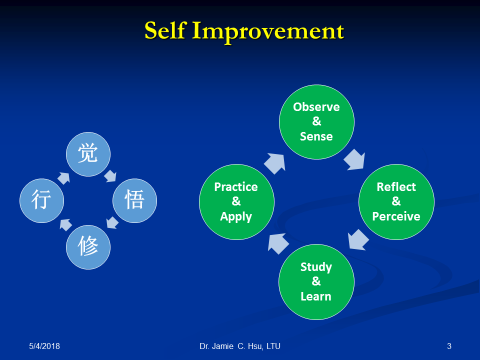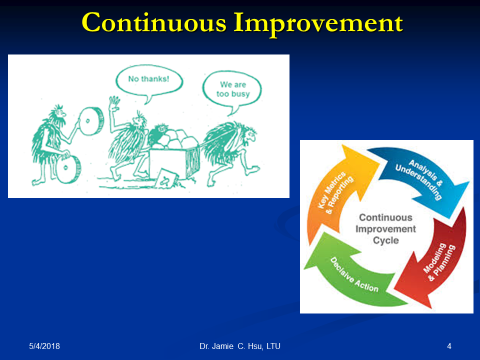
Continuous Self-Improvement
– Musings of Dr. Jamie C. Hsu, 5.13.2018
Two frequent comments from readers of my blogs are: “What you suggested is easier said than done,” and “I am too busy to find time for self-improvement.”
Let me clarify and elaborate a bit more about the intent of my blogs. Most of the blogs are initially triggered by current events or questions raised by friends. I then try to offer some thought starters based on my own observations, reflections, learning, and practices about that particular subject matter. Most of my suggestions are empirical, not necessarily science-based. The purpose is to give the readers something to read and to reflect on. Even more importantly, the blogs are meant to be used to open communication and encourage discussion with family members, friends, and colleagues.
The origins and thoughts of most of the blogs are generated from the 4 stages of self-improvement as described in Buddhist teaching:
觉: Observe and sense the events and living creatures around us, and also be in tune with our own reaction and feelings.
悟: Reflect to understand why the events and feelings are happening, and perceive the meaning of them from various perspectives to be enlightened.
修: Study and learn from the teaching of experts and gurus to gradually change our behavior and habits as needed.
行: Practice and apply the new way of living, and then go back to the beginning of the cycle to sense and observe our progress.
This cycle of self-improvement is very similar to what has been practiced extensively in the corporate world for companies and teams conducting continuous improvement. The steps of planning, executing, measuring, and analysis are essential for productivity improvement, problem solving, and company renewal.
Yes, individual self-improvement and continuous company improvement are tough to do. The process can be time consuming and full of setbacks, but the rewards of becoming a better person and a more valuable company will make all the effort and hard work worthwhile.


覺‧悟‧修‧行
-作者 許俊宸博士
-中譯 薛乃綺
目前最常收到大家對我Blog的回覆意見分別是:”建議很好,但是做起來很不容易”、”實在太忙,沒時間自我精進”。
我想藉這個機會,對自己寫這個Blog的目的再說得更詳盡一些。其實大部分的Blog都是由一些當前時事、或周遭朋友所提問而觸發的。於是我嘗試著去根據自己觀察、反思、學習、甚至是曾經對於特定議題的實踐,來提供一些初步的想法。我所提供的建議,多數是基於過去經驗,而不一定是以科學研究為基礎。目的是讓看的人能去讀一些東西、去想一些事情。更重要的是,這些Blog是用來開啟與家人、朋友、同事之間的溝通和討論。
大部分Blog的起源和想法,都來自於佛學中所闡述如何精進自我的4個階段。
- 覺:觀察並感受到周遭所發生的事情及众生像,並且去感受自己的反應與心態。
- 悟:反思去了解事件和感受為何發生的原由,並從不同的角度去了解它們的意義,從而得到啟發。
- 修:學習並借鏡專家與大師們的指導,以此逐步改變自己的行為與習慣。
- 行:練習及運用新的生活方式,然後回到循環的最初,再去感受並觀察自己的進度。
這種‘自我精進’的循環,與組織和團隊所進行的‘持續改善’十分類似。規劃、執行、量測及分析等步驟,對於提高生產力、解決問題、更新組織而言至關重要。
的確,不論是自我精進或組織持續改善,都是很難做到的、要花費許多時間、而且充滿挫折。但成為一個更好的人、一個更有價值的組織,这回報,会讓過程中的努力與辛勤都變得很值得。


